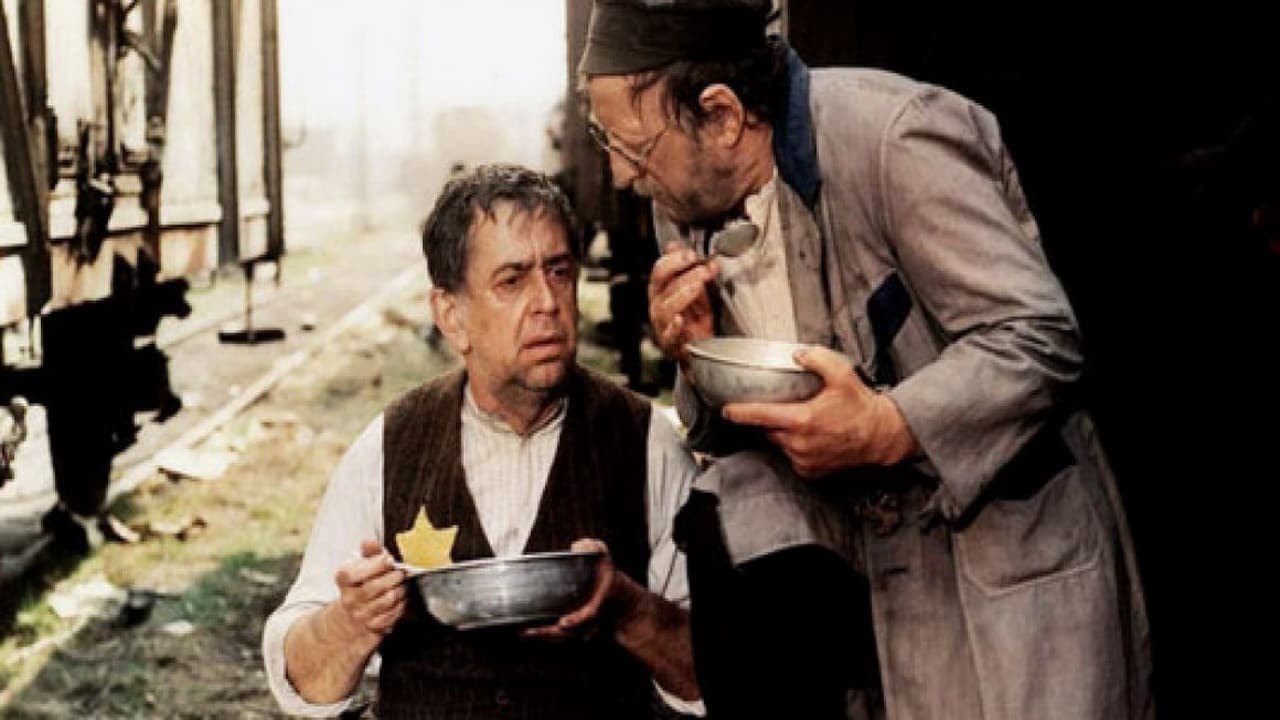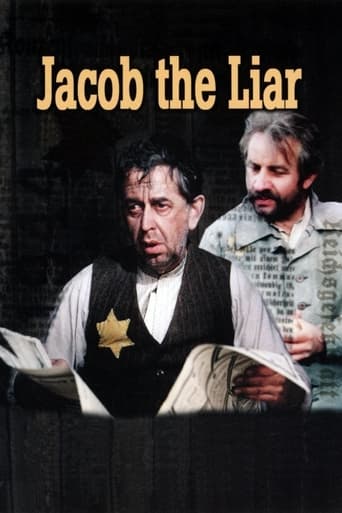

As you can see in, the film, different kinds of aesthetics were used to create this kind of environment that the director wants us to experience. By using close-up shots, we could see and feel the character's feelings and emotions first hand, as if we are right in front of them, every detail of it, and we can really relate to that kind of scene, and that makes the film more personal and up-close to the viewers. Another thing is the claustrophobic environment which depicts the kind of life in the polish ghetto and makes us feel and experience that we are also in that environment. Another interesting shots in these film is the long shot used in the somewhat castle like structure and the clouds in the end part. You could not usually see that in a Frank Beyer film specially that most of his films shows close-up and mid-ranged shots. Another intriguing fact here, that's the first ever German Film that I had watched in colored and so does Frank Beyer's first time to use modern technology to enhance his film. The blending of colors as I may say is good and it really enhances the scenes and the character's emotion. You could see that much livelier and lighter colors appears when Jacob and his niece were in a dream sequence, so does when people gets hope from the news Jacob brings, their faces light-up and so does the surrounding. When it come to the storyline and background of the film, you could easily see that the film really focuses on people's reactions, emotions and their life as a whole in the ghetto rather than really opposing and getting into the antifascist theme that Beyer usually does in his films. Natzis here portrays a different side of the story as they are somewhat humanized or rather has shown the soft side of the Natzis as rationale beings and considerable ones if I may add. I have also seen the remake of this film, the one starred by Robin Williams. I really never thought that this film is much better than the remake. Nothing beats the original.To sum it all up, I think it's really one of the best movies Frank Beyer has ever done.
... View MoreThe Holocaust has been told in many different ways. We have seen the brutality of it in documentaries on cable as well as in a number of contemporary films. The visuals of Aryan supremacy in Leni Reifenstahl's Nazi propaganda films, images of mountains of dead Jews and extremely inhumane conditions in death camps in Schindler's List, serve not merely to drive the film narrative but stir our emotions as well. These images have conditioned us to read such films and documentaries using stereotypes of both the Jews and the Nazi Jews are good and the Nazi, evil. The film Jakob the Liar explores the holocaust in a new light, presenting anti-Semitism in a relatively subtle way without compromising its substance as well as the film's power to move human emotion.The music is monotonous suggesting the monotony of the protagonists' lives in the ghetto. Shots are limited to medium shots and lots of close-ups making one feel claustrophobic, enveloped, and asphyxiated even. This immensely adds to an atmosphere of hopelessness and despair. Close-ups also give specific information about the character, their feelings, the way they live, the things they've gone thought and their relationships with each other. The personal information provided us makes us develop a sense of closeness with the characters. Midway in the film, we already have a bond with the characters, we already know their real feelings despite the lightness, surrealistic and oftentimes humorous treatment of the scenes. It is also quite extraordinary to depict the Nazi they way this film did considering that this is a holocaust film and one of the first East German film to tackle the subject. Unlike in other film where the Nazis are portrayed as unreasonably evil and sadistic, here we are given a glimpse of their humanity. In the introductory scene where a tower guard tells Jakob to report to Gestapo headquarters for not complying with the curfew, we saw instances where Jakob would have surely been severely punished or even killed but the officers were surprisingly reasonable and just. One officer caught him eavesdropping but lets him go, Jakob then wakes up a sleeping head officer to report his misdemeanor yet even with being irritated for being roused awake, he lets Jakob go without a scratch. The tower-guard, proved wrong, lets Jakob go as well. We also saw guards who are not necessarily the perfect Aryan depicted in Riefenstahl films. There was one guard who walks with a limp and another having the runs. There was also a scene where one guard beats up a Jew (Kowalski), then later returns and drops two sticks of cigarettes for Kowalski - an unspoken apology for having beaten up the Jew. A Nazi apologizing to a Jew in a holocaust film! Is that something or what? But then, the film doesn't make us hate the Nazi guards or to view them as the villains in the film. Instead we are made to understand the situation and the circumstance is the real enemy here. This is not a movie pitting the Jews against their Nazi guards like the director's own "Naked among Wolves"; this is a film about a people's struggle to maintain their dignity and humanity amidst the hardships they have suffered.The film started with glimpses of the ghetto and Jakob checking out his sick niece, all these visuals already gives us an idea of the life of the protagonist and the place he lives in. Then in a very short verbal exchange with one of the ghetto's denizen, Jakob gives us a background of his situation, that a guard took his watch from him. The guy he was talking to on the other hand warns him about the curfew to which he answers that without his watch, has no way to tell time. This sequence tells us that first, the guards can take and do take from the Jews anything they want and second, that the people are in constant fear of the guards and dare not disobey any rules lest one wants to be severely punished or killed. It also tells us that in the event that Jakob gets killed, he will be leaving his young and sick niece to care for herself. The character's actions and mood also imply of a prevailing state of constant fear - whether that of being killed or seeing someone close to you die a meaningless death.The Jews in the film were waiting for an inevitable annihilation, a fate they have long accepted until Jakob gave them an alternate view of the future because of his news of a possible liberation by the Russians.Through out the film, we are still constantly given pieces of Jewish life before the ghetto. Through flashbacks and what the characters say, we are presented concrete glimpses of how their lives of the films protagonists were before the ghetto. We also shown that in the ghetto, former actors, lawyers, businessmen and even people from the church lose their former identities. In the ghetto, they are made to wear the star and made to work and follow rules like everybody else, albeit their former position or affiliation. Everybody suffers, everyone is subjected to the harshness of ghetto life everyday there's no distinction in class, social status, age and/or sex. We see old people doing hard labor, children getting sick and eating mere crumbs or pieces of vegetables. We see the protagonists picking flies out of their soup and making a feast out of minced onion and a slice of bread. Frank Bayer told the story and made us feel what the characters felt using visuals and very powerful visuals at that.
... View MoreThis is an interesting film. However, I must say that I was very disappointed at the end. I expected something totally different. First, I thought it would be a comedy. But soon I found out that this was not the case. The film is about Jacob, an old Jewish man. He lies throughout the movie that he has a Radio, just to keep the hopes up of the people around him. Everyday he tells the people around him that the Russians are moving closer and that soon they will be free from the Nazis. As the movie goes on things get more complicated and at the end he decides to tell the truth, but no one believes him. Even though he had good intentions, Jacob did not achieve his objective. All he did is cause more problems in the ghetto.
... View MoreThe role of Jacob is that he is a Jewish man who lives in Poland at the time of the Nazi-rule. He falsely tells a coworker about a radio he owns and he tells him good news about the Russian Army getting closer and closer everyday. This lie spreads quickly thru the Jewish ghetto and immediately all coworkers ask Jacob daily about news. In desperation Jacob makes up good news and spreads them around the ghetto. As the movie moves along it shows violence and prosecution of the Jewish people. At the end of the movie the ghetto including Jacob leave their home town and head in unknown direction. Jacob lied about the radio and spread good news to keep hope and live in his community. He did not reach his goal because his predictions of freedom of Jews never occurred.Bernandin Mali
... View More